news
‘Obasanjo had N20,000 when he returned from prison, He has no right to accuse people of corruption’ – Afenifere Chieftain spits fire

Afenifere chieftain, Chief Ayo Adebanjo, says former President Olusegun Obasanjo has no moral right to accuse anyone of being corrupt.
Describing Obasanjo as a “whited sepulchre,” Adebanjo said the former President had not disputed that he had only N20,000 in his bank account as of when he returned from the prison in 1999 and that a former Vice-President, Atiku Abubakar, and a businessman, Oyewole Fasawe, saved him from bankruptcy.
Adebanjo said if Nigeria were a decent society, people like Obasanjo would never feature in public life again, saying it continued to amaze him how people continued to give the former President “undue prominence in spite of his known character.”
He said he was sure that “when a real government of the people comes into power, they would take Obasanjo’s Presidential Library Complex in Abeokuta” from the former President.
Adebanjo, who will turn 90 years on April 10, said these in his autobiography, Telling it as it is, which was publicly presented in Lagos on Tuesday.
He attacked the former President, particularly in chapter 13 of the 233-page book, which he titled, ‘Awolowo, Obasanjo and the Yoruba Nation.’
At the event, chaired by a former military Vice-President, Cmdr. Ebitu Ukiwe (retd.), were the national leader of the All Progressives Congress, Bola Tinubu, and former governors of Ogun State, Chief Olusegun Osoba and Otunba Gbenga Daniel.
Also present was a former Commonwealth Secretary General, Chief Emeka Anyaoku, a former Secretary to the Government of the Federation, Chief Olu Falae, a former Minister of State for Defence, Musiliu Obanikoro, a former Minister of Industry, Mrs. Nike Akande, the founder of Latter Rain Assembly, Pastor Tunde Bakare, and Chief Albert Horsfall.
Also present were the Chairman of First Bank Nigeria, Mrs. Ibukun Awosika, industrialist, Chief Rasaq Okoya, Prof. Pat Utomi and Tony Elumelu.
In his book, Adebanjo described Obasanjo’s eight years in government between 1999 and 2007 as a civilian President as a tragedy and calamity, declaring that his scorecard was nothing to write home about.
He wrote, “The man who carried on as if he was all-in-all failed woefully on all counts as President. His eight-year tenure (1999-2007) was a tragedy. His scorecard was nothing to write home about. What did he do in eight years? Before he came, we were buying fuel for N20 per litre, and crude oil was $23 per barrel. In 2007, under his regime, we were buying fuel at N75 per litre, and crude oil was between $65 and $75 per barrel. In the worst days of Abacha, one dollar was over N120.”
Adebanjo, a disciple of the late sage, Chief Obafemi Awolowo, said Obasanjo humiliated Awolowo, when the latter visited him to discuss the interest of the Yoruba after Obasanjo became the military head of state following the assassination of Maj. Gen. Murtala Mohammed on February 13, 1976.
He said, “There are many incidents to show that Obasanjo is anti-Yoruba. He has no interest in, or sympathy for the Yoruba cause, he only has his own interest for everything he does. That is my conclusion, and I have copious evidence to prove it.”
Adebanjo also blamed Obasanjo for the collapse of the Alliance for Democracy by picking the late Bola Ige, a member of the AD, as a minister in 1999 against the wish of the party.
He said, “As far as I am concerned, the moment Bola Ige joined Obasanjo’s government, following his (Bola Ige) loss of AD’s presidential primaries where he polled six votes against Chief Olu Falae’s 17, marked the beginning of the end of the party. In my opinion, these are the scenarios which led to the collapse of the AD.”
In his remarks at the event, Anyaoku described Adebanjo as “one of those who have been responsible in creating the history of our country.”
Anyaoku said like Adebanjo, he witnessed the time when Nigeria operated regional governments and did very well.
He said, “I lived in those years and there has never been any doubt in my mind that our country, Nigeria, was doing extremely well when it had a true federation of four regions, with each region developing at its own pace, with its citizens feeling proud to belong to the bigger Nigerian country.
“We have since, of course, lost that basic structure of governance and when we think about the progress we were making in those days, we think, first and foremost of the Western Region under the leadership of Chief Obafemi Awolowo… Those were days when there was healthy competition in the Eastern Region of Nigeria, Chief Awolowo’s counterpart, Dr. Michael Okpara, was also focusing on the development of his region; the agricultural development in eastern Nigeria was very significant; and in the Northern Region, Sir Ahmadu Bello was also learning from the experience of his colleagues in the Western Region, the Eastern Region and the Mid-West Region.
“Those were days when you could talk about the famous groundnut pyramids in northern Nigeria or talk about the vast plantations of cotton that Nigeria was producing and indeed, you could talk about the very high quality hides and skin, which were being marketed abroad as Moroccan leather because of their superior quality. And the country as a whole was doing reasonably well.”
Anyaoku blamed the military intervention for the woes of the country, arguing that the military should not have altered the constitution.
He said, “I believe that if the military had not intervened in our governance in January 1966 and remained in power for so many years and if they had not disfigured our constitution, I used the word disfigured advisedly, because I do not believe that there is any country in the world that has the diversity that Nigeria has, diversity of peoples who have lived for several centuries in their geographical areas, who have their distinct cultural traditions.
“I don’t believe there is anywhere in the world where such a country with such diversity can live under a unitary government. So, we do need in Nigeria, a true federal structure and this was one of the abiding thoughts that Chief Obafemi Awolowo advocated throughout his life and the legacy that he left.”
Also speaking, Tinubu described Adebanjo as a principled and upright man, saying he owed his election as governor of Lagos State in 1999 to Adebanjo’s insistence on fair play.
Tinubu said he aligned with Adebanjo on the call for restructuring and true federalism.
He said, “I respect him for his principled stand on issues of the country. If you don’t understand him, you might say he is divisive but what is the meaning of restructuring, if not true federalism? If not about freedom and opportunity for each federating units to come up with their blueprints, govern and promote the unity of the country. What is the meaning of restructuring, if it is not about resource management and opportunity for true federalism in any democratic setting? I agree with that and I am with him on that.”
news
Journalists for Good Governance Shines Searchlight on Local Government Administration

Journalists for Good Governance Shines Searchlight on Local Government Administration
…Calls for Accountability in Nigeria’s Grassroots Governance
LAGOS, Nigeria — A civil society coalition known as Journalists for Good Governance(JGG) has intensified public debate on transparency and accountability within Nigeria’s local government system, urging media professionals, civil society actors, and citizens to hold grassroots leaders accountable.
Speaking an event in Lagos recently, the acting chairman of the society, Comrade Bunmi Obarotimi said that despite reforms such as the Supreme Court’s 2024 ruling granting financial autonomy to all 774 Local Government Areas (LGAs), systemic challenges continues to hinder effective service delivery and responsible stewardship of public funds.
“Local governments are the closest tier of government to the people — yet too often they remain the least transparent. Without civic oversight and vibrant media, promises of autonomy ring hollow.” the acting chairman said.
The Journalist for Good Governance emphasised crucial roles that journalists can play in uncovering discrepancies in council spending, flagging poor service delivery, and educating citizens on their rights. Their call comes amid wider efforts by media and civic organisations to bridge accountability gaps. The civil society initiatives had previously launched monitoring campaigns to track local government expenditures and have been quietly advocating for transparency in how public money is deployed.
The leaders of the Journalists for Good Governance (JGG) highlighted the importance of physical assessment and citizens engagement on projects to boost people’s confidence, urging local councils to adopt open data platforms and proactive information dissemination in compliance with the Freedom of Information Act. Experts say the majority of LGAs currently lack operational websites or digital portals, further limiting public scrutiny.
The Journalists for Good Governance initiative aligns with sustained advocacy by civil society groups and governance experts calling for a collective approach to strengthening democratic accountability, and has decided to engage in critical and holistic assessments of how Local Governments is being run and the impact and quality of projects they embark-on and to address deficits in transparency and public trust.
Meanwhile, some state governments have signalled support for improved community engagement. In Lagos State, authorities reiterated a commitment to enhancing community media platforms as vehicles for civic participation and accountability at the grassroots level.
The renewed spotlight on local government administration has reignited public debate over fiscal responsibility and priorities. Controversies such as the widely criticised Adamawa council chairmen’s wives trip to Istanbul — which drew public outrage for perceived misuse of public funds — underscore why watchdog groups say stronger oversight mechanisms are urgently needed at the grassroots.
Citizens and activists have welcomed the journalists’ initiative, calling for sustained media engagement that goes beyond headlines to influence policy and accountability reform.
The civic rights advocates note that real change will require robust legal frameworks, a free press, and empowered communities equipped to demand transparency at every level of governance.
As Journalists for Good Governance mobilises its members, the coming months are likely to see heightened media attention on grassroots administration — from council budgets and service delivery to the enforcement of public information laws and digital transparency initiatives.
news
ANOTHER PROPHECY FULFILLMENT BY PROPHET KINGSLEY AITAFO OVER THE EXIT OF DR. KENOLY, ANNOUNCING FEBRUARY’S OPEN PROPHETIC REVIVAL
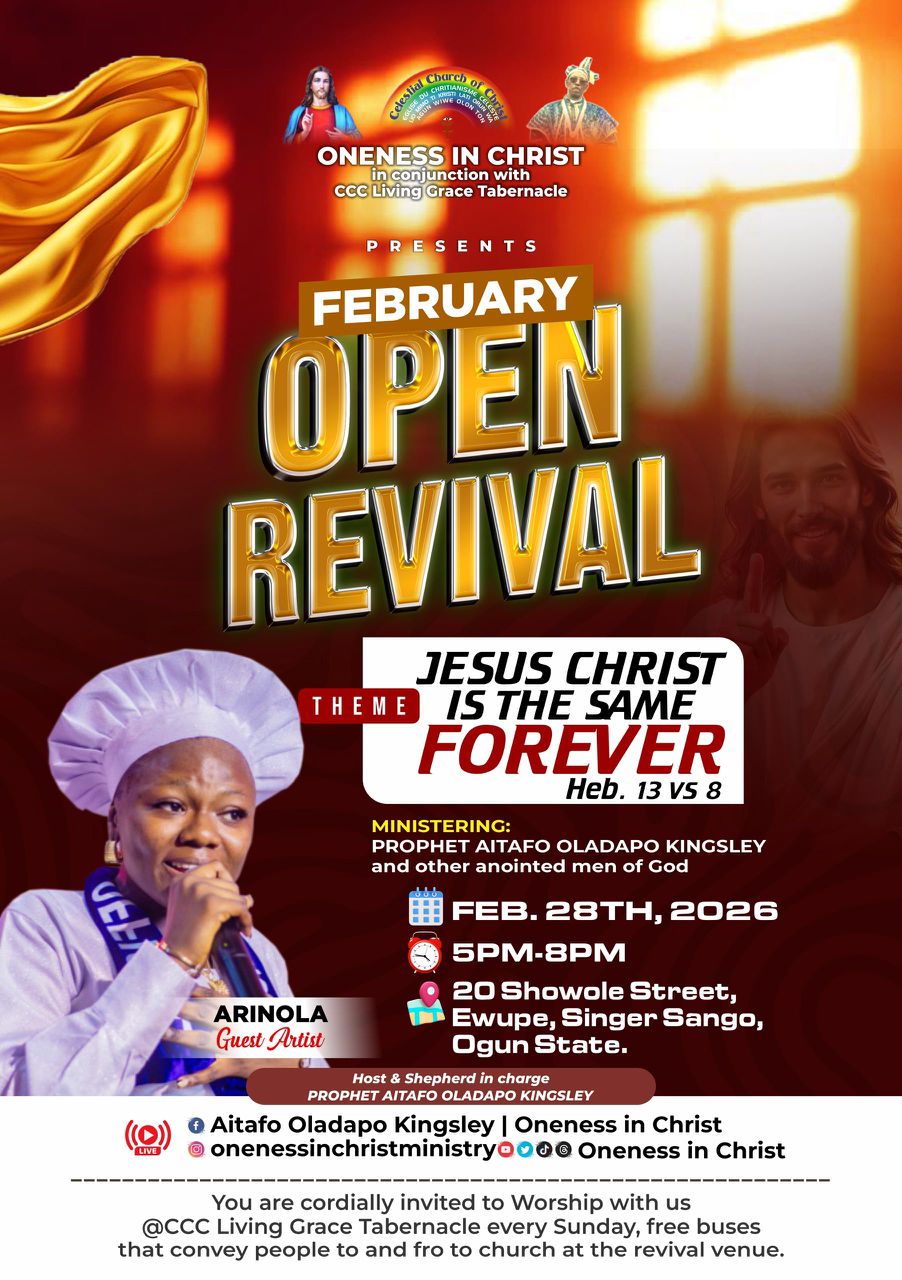
ANOTHER PROPHECY FULFILLMENT BY PROPHET KINGSLEY AITAFO OVER THE EXIT OF DR. KENOLY, ANNOUNCING FEBRUARY’S OPEN PROPHETIC REVIVAL
– Another Prophecy Fulfillment by Prophet Kingsley Aitafo Following the Passing of Ron Kenoly Ahead of February Open Prophetic Revival
– Prophet Kingsley Aitafo Records Another Prophecy Fulfillment as February Open Prophetic Revival Is Announced
In the released prophecies for 2026, renowned Nigerian cleric, Prophet Kingsley Aitafo, shared a series of revelations touching on Nigeria’s economy, global events, political transitions, natural disasters, religious transformations, and the future of world leaders.
During a special prophetic session, the prophet stated that he foresaw the departure of two world-renowned musicians in 2026 and urged the Nigerian people and the global community to pray for them.
He urged Nigerians and everyone around the globe to pray for the musicians, among other prophecies, and already gave insight concerning them.
On February 3, 2026, American gospel singer, songwriter, and worship leader Ron Kenoly passed away at the age of 81. Widely known as the “Professor of Praise,” Kenoly was celebrated for anthems such as “Majesty” and “Lift Him Up,” which have significantly influenced modern congregational worship around the world.
He was recognized as a pioneer of the contemporary praise and worship movement, leading Scripture-based worship services that became widely adopted in churches across different nations and cultures.
The development has been described by followers of Prophet Kingsley Aitafo as a confirmation of the prophecy earlier declared in the year.
Meanwhile, Prophet Kingsley Aitafo, leader and shepherd in charge of Oneness in Christ, in conjunction with CCC Living Grace Tabernacle, invites everyone to its February Open Revival. It is a prophetic service determined to change lives through miracles, healings, signs, and wonders.
It is not an ordinary service; it is another time for a divine encounter where your faith is strengthened, prayers are answered, and breakthroughs and favour are about to rain. With its theme — Jesus Christ is the same forever — the revival is promised to release the power of Jesus Christ like never before. It is a period of shift and divine encounter.
This revival service is said to hold on the 25th of February, 2026, from 5pm – 8pm at 20, Showole Street, Ewupe, Singer Sango, Ogun State.
It is a season where God is ready to reveal Himself like never before. Members of the public are invited to attend.
news
GEN CHRISTOPHER GWABIN MUSA SUPPORT INITIATIVE COMMENDS STATE-FEDERAL COLLABORATION IN ZAMFARA

GEN CHRISTOPHER GWABIN MUSA SUPPORT INITIATIVE COMMENDS STATE-FEDERAL COLLABORATION IN ZAMFARA
The Gen Christopher Gwabin Musa Support Initiative (GCGMSI) has commended the Zamfara State Government for its decisive contribution to security operations through the donation of newly acquired armoured personnel carriers (APCs), surveillance drones, and other critical operational equipment to troops and security agencies in the state.
This commendation was contained in a statement signed by the Convener of the GCGMSI, Ibrahim Dahiru Danfulani, Sadaukin Garkuwan Keffi/Betara Biu, and made available to the press.
The equipment was formally commissioned on Wednesday, February 18, by the Grand Patron of the GCGMSI and Minister of Defence, General Christopher Gwabin Musa, OFR (rtd.), in a ceremony at the Government House, Gusau. The event was attended by senior military officers, heads of security agencies, and top officials of the Zamfara State Government.
The GCGMSI, in its statement, hailed the donation as a “transformative and timely intervention” that aligns perfectly with its core objective of advocating for and supporting tangible measures that enhance the operational capacity and welfare of Nigeria’s security forces. The Initiative praised Governor Dauda Lawal’s administration for moving beyond rhetoric to actionable, material support, describing the move as a “blueprint for state-level collaboration in national security.”
“The provision of these assets by the Zamfara State Government is a testament to visionary leadership and a profound commitment to the peace and stability of its people,” the GCGMSI statement read. “It represents the exact kind of synergistic partnership between state and federal authorities that the GCGMSI champions. This initiative will significantly close operational gaps, boost the confidence of our gallant troops, and send a strong message to criminal elements.”
Speaking at the commissioning, General Musa emphasized that sustained collaboration is indispensable in confronting the nation’s evolving security challenges. He specifically commended Governor Lawal for his proactive support.
“Governor Dauda Lawal has demonstrated exemplary leadership and an unwavering dedication to the security of Zamfara State,” the Defence Minister stated. “The provision of these armoured vehicles, surveillance drones, and other operational equipment will undoubtedly boost the morale and operational effectiveness of our troops and other security agencies on the ground. This is a commendable effort that should be emulated by others.”
The newly commissioned assets, which include multiple APCs and advanced surveillance drones, are expected to dramatically enhance the mobility, protection, intelligence-gathering, and rapid response capabilities of security forces, particularly in the state’s remote and difficult terrains where anti-banditry operations are ongoing.
In his remarks, Governor Lawal reiterated his administration’s steadfast commitment to being a reliable partner in the security architecture. He urged security agencies to deploy the new resources responsibly and effectively to safeguard lives and property.
The Federal Government, through the Ministry of Defence, reaffirmed its commitment to continuing and deepening such partnerships with state governments across the nation to strengthen coordination and resource allocation in the collective fight against insecurity.
The GCGMSI concluded its statement by urging other state governments to take a cue from Zamfara’s “bold and pragmatic” approach, affirming that such concrete support is vital for achieving lasting peace and security across Nigeria.
-

 celebrity radar - gossips6 months ago
celebrity radar - gossips6 months agoWhy Babangida’s Hilltop Home Became Nigeria’s Political “Mecca”
-

 society6 months ago
society6 months agoPower is a Loan, Not a Possession: The Sacred Duty of Planting People
-

 society5 months ago
society5 months agoReligion: Africa’s Oldest Weapon of Enslavement and the Forgotten Truth
-

 news6 months ago
news6 months agoTHE APPOINTMENT OF WASIU AYINDE BY THE FEDERAL GOVERNMENT AS AN AMBASSADOR SOUNDS EMBARRASSING






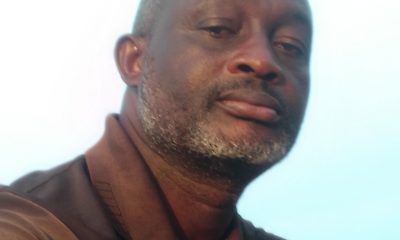

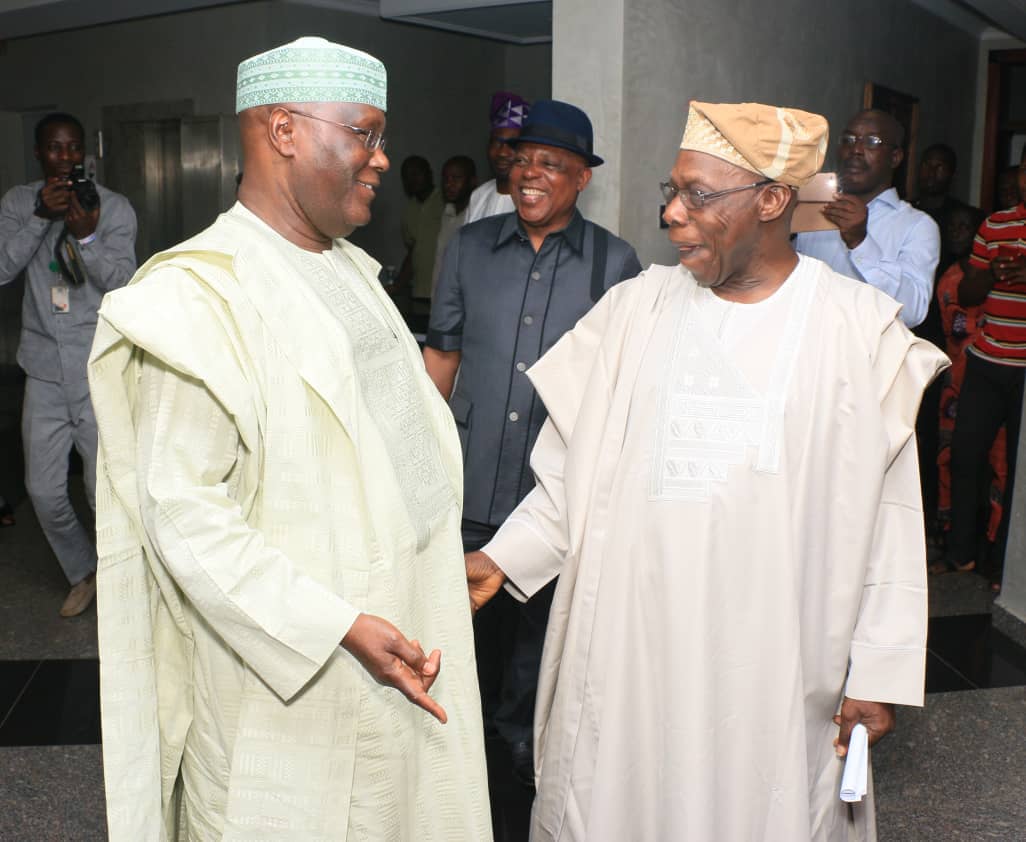
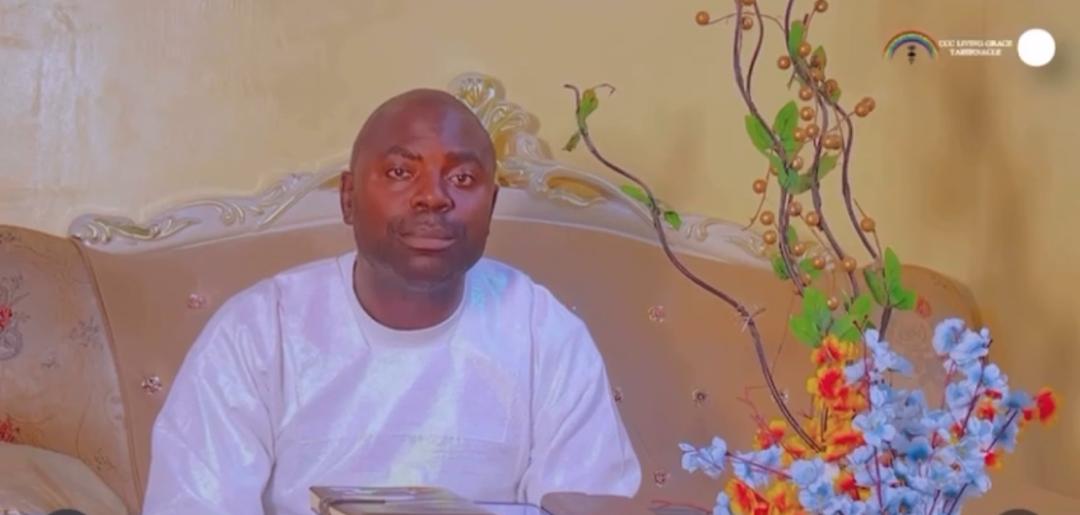
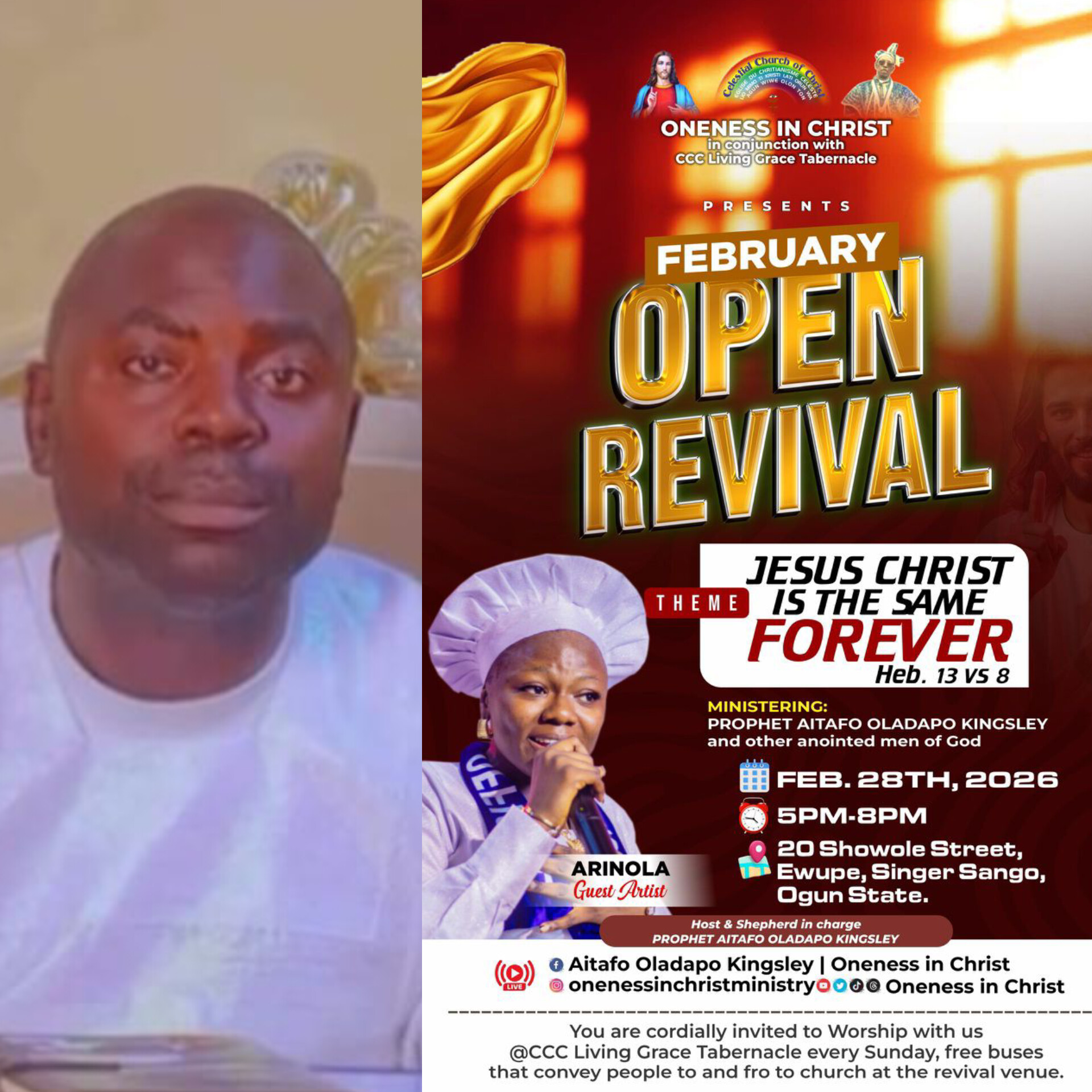

You must be logged in to post a comment Login